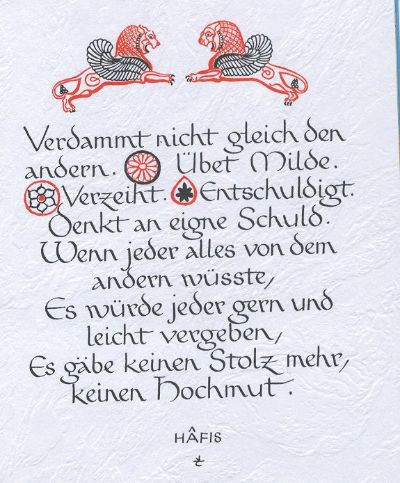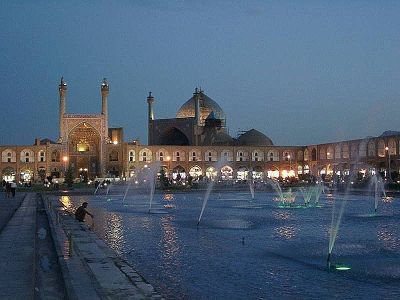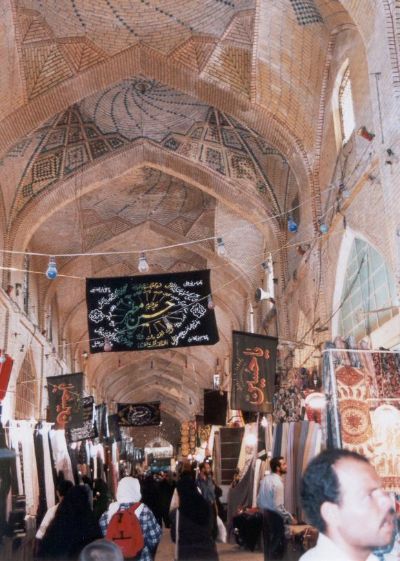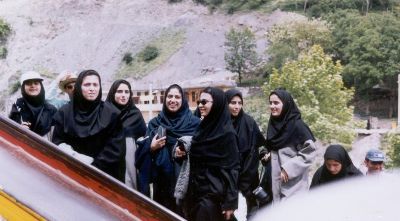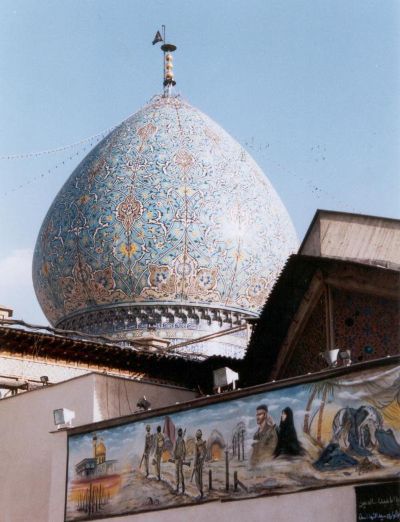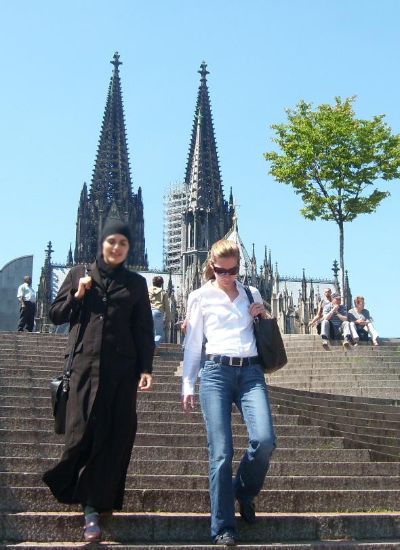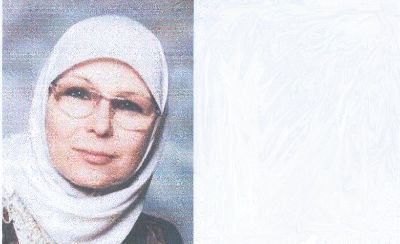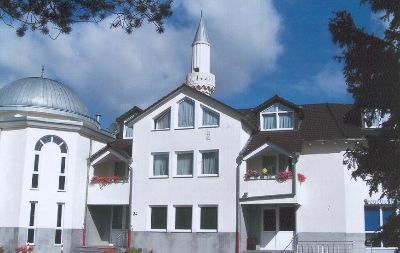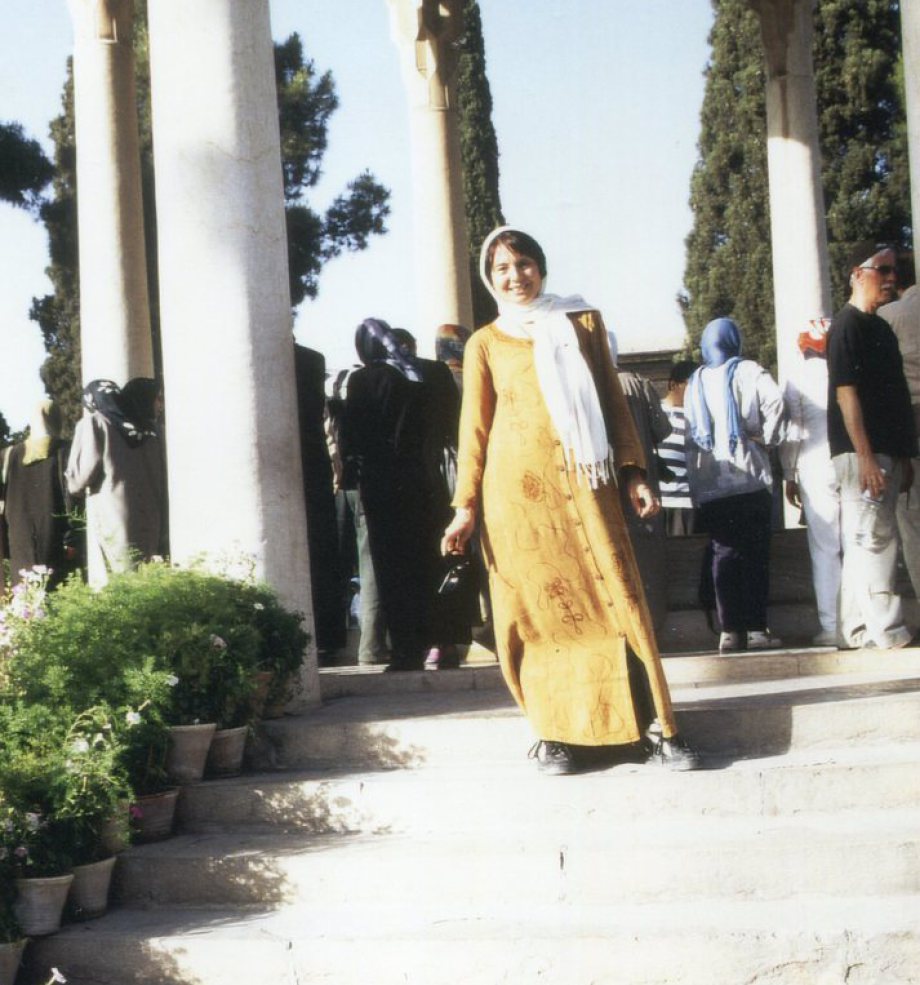
unten: Bazar in Shiraz, Iran
GERMANIC EYES ON ISLAMIC CULTURE
The Mickey Mouse sticker was scratched off the window on the bus standing next to ours. It's Un-Islamic, we were told. Alright, we thought: when in Rome, do as the Romans, we had better do as the
Iranians when in Iran. There were seventeen of us in the bus. 14 Germans, 8 ladies and six men, as well as three Persian men, the tourist guide, the driver and an assistant. Together we were to
travel 6000 km around the Iranian plateau, from up north at the Caspian Sea, down to Bam, the citadel not far from Kerman, on the road leading to Pakistan.
The eight ladies adjust their headscarves, practising solidarity with all the other women in this region. It is no accident that occidental tourists like to travel to Iran. They like to follow the
track of their own cultural and historical background in the Orient. The events that took place here were to have an effect on people's lives in Europe centuries later. While Europe was still
sleeping, this is the region where Persians and Arabs had first understood the value of Indian, Babylonian, Arabic, Greek and Roman thinking, gathering the largest available complex of knowledge in
medicine, astronomy, physics, mathematics known at the time anywhere in the world. The Abbasids, who were predominantly Persian in origin, created a flourishing civilisation in the 9th century.
Without them, the works of Aristoteles, Socrates, Euklid, Pythagoras, Hippokrates, Achimedes and others might not have achieved the impact they were finally to have on our lives.
We wanted to see the remains of that culture. Standing in front of the Masdjid-e Imam in Isfahan, we eight ladies from Germany tuck our headscarves even tighter into our faces. Because it seems that
the beauty of the mosques quite naturally demands a headscarf and a chador. It fits in well with these awesome surroundings. We forget our humanly shape - and maybe thoughts - and concentrate on the
message of paradise to come. The colourful interior walls remind us of the < eternal garden > , as described in the Qur'an. The cupola resembles the tree of life, mixing with the blue of heaven
the symbol of divinity.
For Europeans who are kept on their toes through a stressful life at work where renovations of the workplace, rationalisations, restructurings and readjustments on account of rapid technological
change are the order of the day, a trip back into history in one of the most eventful regions of the world, the Orient, is a welcome change. The light, hot and dry air of the Iranian plateau of an
altitude above 1000 metres is exhilarating and just the right alternative to the usual grey, moist and heavy air that is more frequently found in Germany. The cotton dress on the skin feels
delightful. Back at home, the same material is heavy and restrictive.
Iranians are hospitable and charmingly inquisitive. One family on the banks of the Zayandehrud in Isfahan was so happy to see a bus of cheerful German tourists having a good time, that they
distributed a piece of a water melon to each of the travellers.
We are frequently approached by groups of women wishing to come into contact with us. Open-mindedness or rather the desire to learn from outsiders are striking. We are also much sought-after
photographic objects. The native citizens of Shiraz; Isfahan, Qhom, Kashan, Yazd, Kerman and other towns, like to be seen alongside Europeans. But for us there is less of a chance to ask questions.
There is so much more to find out about us. "What kind of a political system would I like to see in Iran?" I have no difficulty answering that one: "The one which the majority of the Iranian
population would like to see established, of course." "Personally, I like to live within a democratic system," I added.
In a group, a respectful elderly person sometimes seems to cause inhibitions to talk. It is when we meet Iranians on their own, that their faces light up and they talk to us lightly, naturally and in
a more uninhibited manner. Being allowed to show only their faces to the outside world in public, women's faces are very expressive. Their entire personality is expressed in their face. The lack
of affectatiousness throughout is a relaxation. No ostentatious advertisements glaring, No shocking posters to attract the attention of customers, no magazines with nude females to improve
circulation figures. There is a discreet, natural, good-mannered and refined atmosphere.
I would love to see more of this back at home. But straight away I realise what the price would be: yet more unemployment, yet higher taxes. There seems to a choice for every society: move ahead in
research and development, confronting the subsequent social upheavals and unrest, or stay where you are with what you have achieved, but risk falling back in way of competition that naturally
exists
between countries.
We walk through the bazaars, adoring the many natural products that we see. Carpets, goods made of copper, tin, wood, wool, cotton could be seen plentiful in the bazaars. Only a few of the so-called
"western products" to be seen, such as balloons, synthetic or plastic commodities.
I wish this country with its lovely people all the success that it deserves so much. Whether the Qur'an was 'dictated' or merely 'inspired' by God, but created by a human with the inevitability of
the occasional error, and the need therefore to revise God's message anew every century - as the Greeks thought, I cannot imagine that it is 'Unislamic' to acquire and amass new knowledge. If
open-mindedness and critical thinking has made an Islamic epoch great in the past, it can do so again. But then, it is not for German tourists to judge or interfere.
Published in 'SOCIAL PAGES' in Pakistan, in the spring of 2002
Der Beitrag wurde veröffentlicht in 'SOCIAL PAGES', Pakistan, im Frühjahr 2002
EXPRESSIONS OF FAITH
In a country where religion does not belong to the mainstream of life, an estimated 250 to 350 Germans convert to Islam every year – What is the background to this trend?
Sometimes just a few words can radically change the way people think. In the 17th century a French mathematician and scientist thought up three Latin words which might well fall into this category. After years of learning, René Descartes (1596-1650), also known as the “Father of Modern Philosophy,“ came to the following conclusions about the essence of life: “Cogito ergo sum – I think, therefore I am.” The three Latin words really signified an epoch-making turning point: No longer was God the source of certainty, but the individual. Human empirical experience and human reasoning were to be the essential criteria on which all knowledge was based and through which all progress was to be made.
...NOT FAR FROM COLOGNE'S CATHEDRAL...
More shocks were to come. Experiments contradicted some of the essential statements made about the earth in the Holy Scriptures - the Bible. It was Galileo Galilei (1564-1642), the Italian
astronomer, who had been able to prove beyond any doubt with practical experiments that the earth was not the centre of the universe, but rather revolved around the sun. To the Christian Church this
was ultimate heresy. In 1633 Galileo Galilei was forced by the Inquisition of the Catholic Church to renounce his own discoveries and was placed under house arrest. He died a sick and bitter old man
in Florence in 1642. One of the consequences of these incidents was that people were now faced with the choice of either basing the authority of one’s beliefs upon religious teaching or upon
scientific observations and conclusions.
Reducing the Power of the Christian Church
The people made their choice. The European cultural movement of the Renaissance from the 14th through to the 17th century, as well as the movement which we call “humanism,” spread the belief in the
“perfectibility of man” and had begun to make people less and less content with things as they were, and more interested in improving them there and then. The church at the time was held to be
corrupt: holding vast wealth, exercising enormous political power and waging war. The religion of inhabitants was determined not through personal conviction, but by the state leaders of the various
provinces in Germany. They had the power to decide which Christian faith - Catholicism or Protestantism - their subjects were to belong to! The inability of the representatives of the two different
beliefs to come to terms with each other, and the power political struggles of the various European states that backed one or the other of the two Christian faiths, finally led to the great religious
war called “The Thirty Years War” between 1618 and 1648. During this war, one quarter of Germany’s population was killed or died because of epidemics which had spread during the war.
Having learnt their lessons thoroughly through these trying times, the people’s resistance against clerical authority became stronger. They decided to push religion more and more into the background
and to limit the power of the Christian Church. “Progress” became the first aim, using the scientific method as the way to achieve it. There was a commitment to the search for truth, and a conviction
that morality was acquired through human reasoning. ‘Humanism’ asserts that the knowledge of right and wrong is based on the best understanding of one’s individual and one’s joint interests. This
belief in rationality and progress gave Europeans a feeling of superiority and eventually led to the dominance in the world of the five big European colonial powers: Portugal, Spain, France, England
and the Netherlands.
In spite of all this success, today certain deficits of a rational and materialistic way of life are becoming manifest in a new trend. Religion as a power factor is coming back in strides. Those
people who culturally hate religion and appeal to secular values and reason, had not realized that the religious absolutism they denounce is only a variety of their own fundamentalism - reappearing
in a different guise. One extreme attracts the other extreme.
Abdul Hadi Hoffmann is a German who was formerly known as Christian Hoffmann. He is one of around 250 to 350 Germans who convert to Islam every year. It is estimated that there are about 15.000 to
40.000 Muslims of German descent. Exact figures are not known. Most of these have converted because their partner belongs to the Islamic religion. But there are Germans who convert to Islam because
of quite different reasons. Mr Hoffmann recently spoke to a popular weekly newspaper in Germany called “Die Zeit” about his new belief. His conversion story began in 1988 when he was sitting on his
balcony reading about Islam when he became overwhelmed by realizing that the world is Allah’s creation and Islam was the last of the religions revealed by him. The combination of clarity and
orientation appealed to him. “I suddenly found myself confronted with God, without the intermediary of a church, a vicar or saviour as in Christianity.” In 1989 he converted to Islam in the Saudi
Arabian embassy in Bonn. Some of his contemporaries have shown misgivings about the sudden change of his way of life. Yet Abdul Hadi Hoffmann is proud of the fact that all those of his friends who
are practicing Christians have remained his friends.
Another German, Mohammed Herzog, turned to Islam in 1979 out of a friendly curiosity. To him Islam seemed to be the most tolerant religion at the time. It was the beginning of a new life and a new
identity for Mr Herzog. Islam seemed to him to be a monotheistic religion of greater purity. No constructions such as the Trinity, Jesus as the Son of God, the crucifixion and salvation. The Koran is
for him the unadulterated word of God, as revealed by Archangel Gabriel. Prophet Muhammad (PBUH) was a human being. Full stop. Mohammed Herzog appreciates the clarity of the message about what is
allowed and what is forbidden.
Maryam Brigitte Weiss is a courageous German lady now in her fifties, who converted to Islam in her late thirties. She now wears the Islamic headscarf every
single day, considering it to be essential to her belief and demonstrating with it her obedience towards God. There is, however, an important hurdle to overcome. The laws in the state where she earns
her living as a teacher, North Rhine Westphalia (NRW), were changed in 2005. This new law stipulates that the Islamic headscarf may not be worn while on duty teaching. Along with around 30 other
teachers, she challenges the German state court and refuses to take off the headscarf. Some of the other 15 states that make up the Federal Republic of Germany do not yet have such laws concerning
the headscarf. But Germany’s Constitutional Court has ruled in 2003 that wearing religious symbols in public school buildings must either be allowed for all religions, or must not be allowed at all.
As Christian and Jewish symbols are allowed to be shown and worn in public school buildings of NRW, the legal case put forward by Ms Weiss and her colleagues, that, in this case, Islam is being
discriminated against as a religion, has a good chance of being won at the highest level. Ms Weiss is the deputy executive of a large Muslim community – the “Zentralrat der Muslime in Deutschland,
ZMD” (Central Council for Muslims in Germany), and is responsible for women’s issues as well as for Islamic religious instructions. The curriculum for Islamic religious school lessons, which she has
helped to work out, deals for instance with topics such as stories about the prophet Muhammad (PBUH), ethical subjects such as honesty, compassion, or defamation of character, and was met with a
positive response by the state parliament of North Rhine Westphalia as well as by the Christian and Jewish communities. Yet there are still many legal and administrative obstacles to overcome before
they can be adopted by schools around the country.
Ms Weiss has joined a group of Muslim teachers and students who wish to wear the Islamic headscarf, called the “Initiative for the Self-Determination in Faith and Society (ISGG).” She also deals with
women’s issues and works in mosques to help improve the lot of women. This includes advising them about the rights of women according to Islam. As it is quite frequently the negative reports about
the situation of Muslim women in Germany that come to the attention of the media, such as stories about forced marriages or “honour killings”, she informs the German public wherever she can that this
can be put down to tribal traditions, and that Islam does not allow either honour killings or forced marriages. Between 1996 and 2004 it is estimated that 45 murders of this kind were committed in
Germany. Every year, a few hundred women call at special institutions asking for help, as they are being forced into a marriage without their consent. Her extensive Islamic training allows Ms Weiss
to point to the right Islamic attitudes and teachings, so that Muslims understand their religion correctly. But she also implores the parents of her Muslim pupils to make sure that they supervise
their children so that they do as well as possible at school, as this is an essential prerequisite for them to later become integrated in society and lead comfortable lives. Her conviction is that an
Islamic way of life must be compatible here and now with the non-Muslim environment that Muslims in Germany live in. Employment, where only little or no further education is required, has become rare
since those unskilled tasks of working in a production line or in the mining industry have been cut down in big numbers because of competition from overseas.
Of the approximately 3.2 million Muslims living in Germany, around 2.5 million of whom are of Turkish origin. Germany’s overall population lies at 82 million. Most of its inhabitants have a Christian
orientation. With an estimated 2.1 billion adherents, or approximately 33% of the world’s population in 2007, Christianity is the religion with the largest following. It is the predominant religion
in Europe, the Americas, Southern Africa, the Philippines and Oceania. China may yet end up being both the world’s largest Christian country as well as its largest Muslim one. But Christianity, with
its central message to love one’s enemies and therefore to do good unto those who hate us, is undergoing a critical phase – perhaps by insisting on dogma. Open Christian gatherings around Germany
have huge followings and show that there is a need to experience spirituality. Yet quite a number of followers are abandoning institutional Christianity, and churches do not regularly attract big
crowds.
Hans Küng was a professor of Catholic theology, until the church suspended him from his duties because of irreconcilable differences. He and the Pope had been
colleagues in former times. He has written several books on the religions of the world and has a good knowledge of Islam. He talks about the need for religions to reconcile, and also about why
Christianity has lost some of its appeal. The concentration of power and the dominance of the Catholic Church, with its claim that only the followers of the Roman Catholic Church are real Christians,
fail to find much appreciation among believers. Some people who experience life as chaotic or frustrating, with too much emphasis on individuality, too much importance being attached to money and
consumerism, can feel rather more attracted towards Islam than Christianity.
Yet Islam is likewise seen with scepticism. Europeans see Islam with its history of expansionism, moving from North Africa to Spain between the 8th and the 15th centuries and getting a foothold in
the Balkans, where the Ottoman Empire conquered many countries but was finally repulsed just outside of Vienna. Additionally, Islam is nowadays also associated with "honour killings" and terrorist
attacks. Recently two Germans who had converted to Islam were caught by the police in their attempt to plan violent attacks against targets inside Germany. One Member of Parliament of Turkish
descent, Ekin Deligöz, received death threats because she had appealed to Muslim women to abandon their headscarves as it might be interpreted as a symbol of female oppression. These incidents are of
course not inclined to make the German public feel at ease with all of its Muslim compatriots.
But Hans Küng maintains that it is important that Christians remember that not only did they carry out the crusades in the Middle East, but in the 19th century they even made colonies out of many
Islamic countries from Morocco to the Indonesian islands. This has led to huge tensions which have not been resolved by the West, he says. The conflict between Israelis and Palestinians is of
particular significance here. Hans Küng also maintains that it was an error not to recognize Hamas after they had won democratic elections. These fundamentalist groups have done so much for the
electorate in way of education, food and clothing, whereas many Palestinian Muslims have the impression that their own elite do not care enough about them. Much more must therefore be done by all
sides to negotiate reasonable deals for the region. Hans Küng states that, if peace had been made between Israel and the Palestinians after the six-day-war in 1967, there might not be a person called
Osama Bin Laden planning attacks against the West. Of course suicide bombers and terrorists have to be condemned, he argues, but it is necessary to try and understand why so many people are desperate
and are willing to throw their lives away for a certain cause.
On the other hand, the Christian Church has shown courage and morality when Pope John Paul II vehemently opposed the war against Iraq - as did the Patriarch in Moscow, the Archbishop of Canterbury,
the World Council of Churches as well as the US-American Council of Churches.
Islam is to receive more official recognition inside Germany. There was much enthusiasm at the public launch in March 2007 of the long awaited "Coordination Council of Muslims in Germany (KRM)," as
the sole umbrella organisation to represent German Muslims. It represents around 280.000 of the Muslims in Germany and brings together the four largest Muslim organisations: the "Turkish-Islamic
Union for Religious Affairs (DITIB)" with 870 mosques and approximately 110.000 members, the "Islamic Council of Germany (IRD)" with around 140.000 members, the "Central Council of Muslims in Germany
(ZMD)" with 20.000 members, and the "Association of Islamic Culture Centres (VIKZ)" with roughly 24.000 members.
However, this excludes around 500,000 Alevis who also consider themselves to be Muslims. Most Sufi orders, too, remain unrepresented, as do the Turkish Fethullahcis, who are actively involved in
education in Germany and elsewhere. The "Coordination Council" claims to represent more than the majority of Muslims in Germany. But this is not fully supported by the facts. Only around 15 % of
Muslims are organised, and it must be taken into account that those secular Muslims, many of whom came to Europe to escape from a very restrictive form of Islam, do not wish to be represented by
these associations in all matters. In return for obtaining certain civil rights, German authorities are now making more demands on Muslim communities - such as the insistence on learning the German
language, as well as a basic knowledge of the democratic and cultural principles that are being followed in Europe. Pluralism becomes more and more a necessity in our complex societies, with religion
no longer taken for granted or inherited. It is rather based around adults making a choice, going to a mosque, church, temple or synagogue - or simply staying at home to practice one's faith.
A Cultural Revolution for Islam?
Esra Özyrük is an associate Professor of Anthropology at the University of California, San Diego. She is currently writing a comparative book about converts to Christianity in Turkey and converts to
Islam in Germany. She has done much research work in Germany and has discovered that when Islamic leaders give lectures in German, German converts ask endless questions as to what is only a
"tradition" and what is "essentially" Islamic. These efforts help German converts to adapt Islamic practices in a way that makes them suitable to their lifestyles in contemporary Germany. Most
practicing Muslims do not like the phrase "German Islam" because they believe that there is only one Islam. Yet, by asking questions, they are at the forefront of creating this formula and make a
valuable contribution to dialogue between Muslims and non-Muslims. Integration is inevitably a two-way street. When two parties have true contact, both of them will find themselves transformed in the
process.
In the 19th century, the great Islamic philosopher and founder of modern Arab thinking, Jamal Eddin Afghani (1838 - 1898), who has also inspired such famous people as Muhammad Ali Jinnah and Muhammad
Iqbal, commented on the Arab-Islamic world: "The Orient will only find its salvation if it reconciles itself with reason and science." Many are of the opinion that this reconciliation did not take
place. It was frustrated by the failure of Arab socialism and the appearance of Islam as an ideology for political struggle.
Yet there is one project presently taking place, which can be called unique in the Islamic world. In June 2007, the highest Islamic authority in Turkey caused surprise by announcing that it will
define a new, modern Islam. The Diyanat, the Turkish Directorate of Religious Affairs, wants to present a modern image regarding its approach to women by filtering the Hadith for misogynist
statements, and delete them from the collection. The passages to be abandoned include those in which the woman is discriminated against or even regarded as subordinate to the man. Thus, the second
most important source of Islamic law, after the Koran, would become pro-woman, at least in Turkey, and Islam would, in turn, have moved a good part of the way into modern times. However, since the
recently held elections in Turkey, Mr Erdogan is apparently contemplating "modernising" the constitution. The British newsmagazine "The Economist" reports in its November 1st issue: "The new version
would get rid of the headscarf ban at universities. It also keeps some illiberal traits: a clause saying that the state should ensure equality between the sexes has gone. Many women who supported Mr
Erdogan against the army are worried." - The coming events will need to be watched carefully.
A real intellectual return to religion is therefore being witnessed that cannot be reduced to the spread of fanaticism. It is also becoming clear that secularism reinforces rather than overcomes both
religious fundamentalism and militant atheism.
Maybe we are entering a new phase of history - a kind of post-secular phase perhaps. In this new world religion cannot be eliminated, and, if this religion is not abused, it can be a good hope for a
genuine alternative to the existing extremes.


